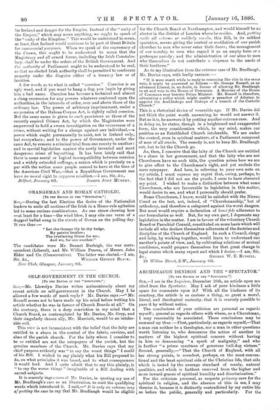SELF-GOVERNMENT IN THE CHURCH.
[TO THE EDITOR OF THE " SPECTATOR." J SIR,-Mr. Llewelyn Davies writes acrimoniously about my recent article on self-government in the Church. May I be allowed a few words of meek reply ? Mr. Davies says :—" Mr. Russell seems not to have made up his mind before writing his article whether he was in favour of Church Boards at all." On the contrary, there is a deep conviction in my mind that a Church Board, as contemplated by Mr. Davies, Mr. Grey, and their singularly chosen ally, Mr. Marriott, would be an intoler- able evil.
This view is not inconsistent with the belief that the laity are entitled to a share in the control of the fabric, services, and alms of the parish church. For the laity whom I consider to be so entitled are not the ratepayers of the parish, but the genuine members of the Church. Mr. Davies says that my chief purpose evidently was "to say the worst things" I could of his Bill. I wished to say plainly what his Bill proposed to do, on what principles it was based, and to what consequences it would lead. And I quite admit that to say this plainly, is "to say the worse things" imaginable of a Bill dealing with sacred subjects.
It is scarcely ingenuous of Mr. Davies, in quoting my use of Mr. Bradlaugh 's case as an illustration, to omit the qualifying words which introduced it. I said,—" It is only an extreme way of putting the mile to say that Mr. Bradlaugh would be eligible
for the Church Board at Northampton, and would himself be an elector in the district of London where he resides. And, putting aside all extreme or unlikely results, this Bill, in its mildest operation, means giving the control or mutilation of our parish churches to men who never enter their doors; the management of our worship to men who regard it as an empty form or a grotesque parody ; and the administration of our alms to men who themselves do not contribute a sixpence to the needs of their brethren."
As to my illustration from the extreme case of Mr. Bradlaugh, Mr. Davies says, with lordly sarcasm :—
"If it were worth while to reply to reasoning like this in the same vein, it might be answered as follows :—Mr. George Russell, as an advanced Liberal, is, no doubt, in favour of allowing Mr. Bradlaugh to sit and vote in the House of Commons. A Member of the House of Commons may become Prime Minister. Mr. Russell is, therefore, advocating a policy which might enable a preacher of Atheism to appoint the Archbishops and Bishops of a branch of the Catholic Church."
This is a rhetorical device of venerable age. If Mr. Davies did not think the point worth answering, he would not answer it.
But as it is, he answers it by putting another extreme case. And in doing so, he states, though in a heightened and exaggerated
form, the very consideration which, to my mind, makes our position as an Established Church intolerable. We are under the control, even in spiritual matters, of a Parliament composed of men of all creeds. The remedy is, not to keep Mr. Bradlaugh out, but to let the Church go.
As, then, I conceive that the laity of the Church are entitled to a share in her government, and that the laity who are not
Churchmen have no such title, the question arises how we are to give effect to the Churchman's right, and yet exclude the mere ratepayer. And here, in referring to your own note on my article, I must express my regret that, owing, perhaps, to the fact that I did not see the proofs, I seem to have obscured
my point. I wished to make a distinction between what some Churchmen, who are favourable to legislation in this matter, would desire to see, and what I personally should prefer.
Some Churchmen, I know, would be satisfied with the Nicene Creed as the test, not, indeed, of " Churchmanship," but of orthodoxy, and therefore a safeguard against the worst dangers. But most would require a declaration of bond-fide adherence to our formularies as well. But, for my own part, I deprecate any
legislation in the matter. I am in favour of' the voluntary Church Board or Parochial Council, constituted on some basis which will
include all who declare themselves adherents of the doctrine and discipline of the Church of England. In such a Council, clergy and laity, by working together, would learn to understand one another's points of view, and, by cultivating relations of mutual confidence, would prepare themselves for that great change in legal status which many expect and which I desire.—I am, Sir,


































 Previous page
Previous page